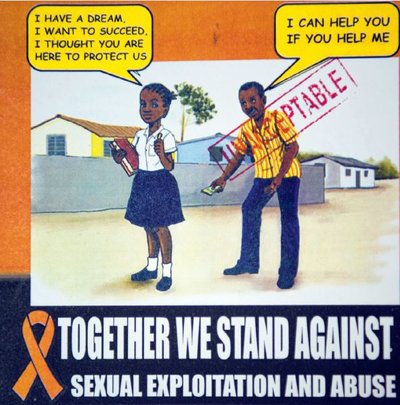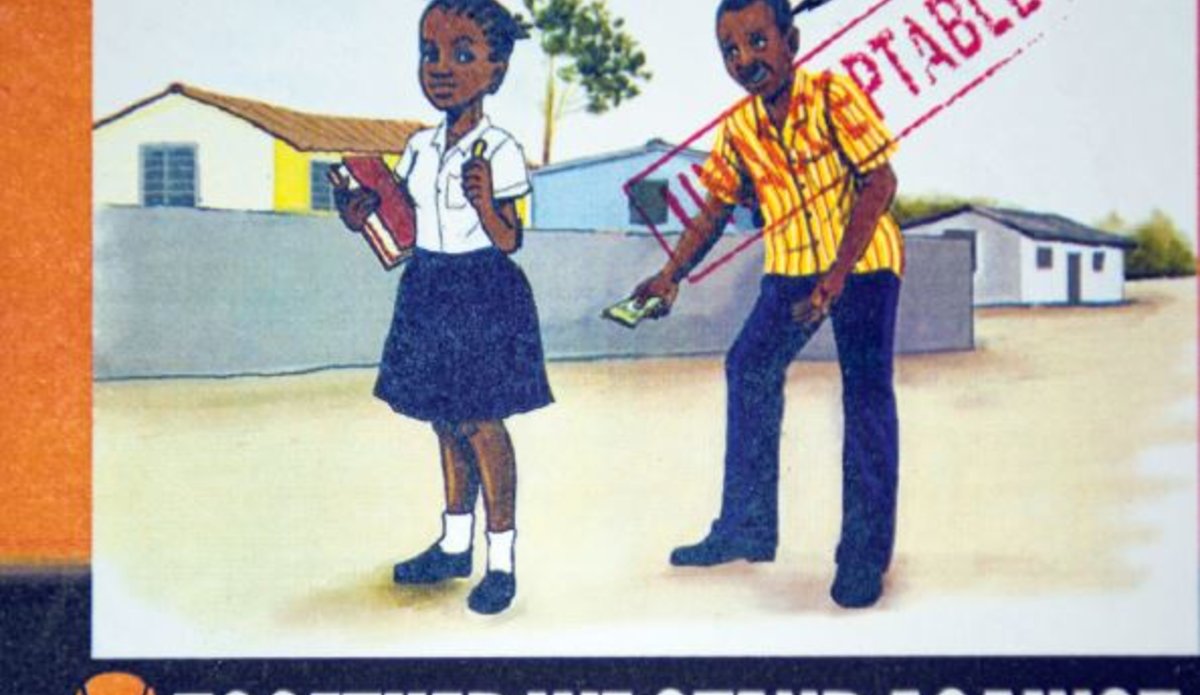The story of UNMIL [Book]: Conduct and discipline team raises awareness, helps victims recover

In November 2005, wracked by allegations of sexual exploitation and abuse among its field personnel, the United Nations Department of Peacekeeping Operations created dedicated conduct and discipline components in its largest peacekeeping missions. UNMIL quickly established a Conduct and Discipline Unit, now a Team, as the Mission’s focal point for all categories of peacekeeping personnel.
After years of civil war, Liberia was one of the five poorest countries in the world. Many people were willing to do anything, including engaging in transactional sex or exploitative relationships just to get food on the table and to make ends meet due to lack of alternative livelihoods. Unfortunately, some peacekeeping personnel took advantage of this situation.
 |
| A poster designed by the UNMIL Public Information Office to support a campaign about sexual exploitation and abuse in Liberia. Illustration: Samson Zogbaye | UNMIL |
For many years, UN rules had prohibited its personnel from engaging in any form of transactional sex, i.e. the exchange of money, food, goods, or favors for any kind of sexual activity, as well as sex with anyone under 18 years of age. But the rules were not widely enforced, and during the peacekeeping missions in the early 1990s-mid 2000s, allegations of sexual exploitation and abuse (SEA) reached a crisis proportion. Secretary-Generals Kofi Annan, Ban Ki-moon and António Guterres have promulgated a zero-tolerance policy; worked with troop-contributing countries and Member States to reduce and punish misconduct; and directed awareness-raising among personnel and policies to curb behavior and assist victims.
Over the years, the Mission received relatively few allegations that its personnel were engaged in sexual exploitation, with a high probability that many cases went unreported, as individuals who saw transactional sex as their only source of income were unlikely to file complaints. UNMIL has placed a special emphasis on measures against SEA which involved a combination of preventive and enforcement measures, as well as remedial action. Its Conduct and Discipline Team was a pioneer in victims’ assistance when it created the first ‘Protection from SEA Network,’ coordinating anti-SEA activities conducted by UNMIL and the UN Offices, Funds, Programmes and Specialized Agencies in Liberia.
In 2017, after the Security Council had decided the date of UNMIL’s closure, and the majority of the peacekeepers had left, complaints increased significantly, including allegations of sexual exploitation that happened years earlier, and in some cases resulting in the birth of a child. Every complaint was taken seriously, and UNMIL’s Mission leadership directly engaged with the complainants to assure them of their commitment to have each case investigated in line with UN regulations and rules.
In cooperation with other parts of the Mission, the CDT ensured that medical, legal and psycho-social support was made available to alleged victims of SEA as soon as possible. Further, it launched pioneer vocational training projects in communities where several complainants lived. This helped women learn new livelihood skills like tailoring and bakery combined with basic business skills, aimed at making the women less vulnerable to exploitation. To reduce stigmatization, these training classes were open to all members of these communities, not just those who filed complaints.
Even when it consisted of just three to four staff members, CDT remained committed to promoting an ethical culture throughout UNMIL until its very end. Examples of its initiatives included an anti-corruption campaign, campaigns to increase awareness of sexual harassment, and the launch of its bi-monthly newsletter “Voice of Reason,” which received positive feedback for its information on SEA and how the Mission was handling it. During its last months, UNMIL CDT increased its coordination and cooperation with members of the UN Country Team as part of its handover, so that victim’s assistance projects could continue even after UNMIL’s departure. One such example was the cooperation with UNESCO to provide adult literacy training for communities vulnerable to sexual exploitation and abuse.
 UN
UN United Nations Peacekeeping
United Nations Peacekeeping

![The story of UNMIL [Book]: UNMIL paves the way for ECOWAS Radio The story of UNMIL [Book]: UNMIL paves the way for ECOWAS Radio](https://unmil.unmissions.org/sites/default/files/styles/gallery_image_thumb/public/field/image/unmil_radio_logo_black_0.png?itok=xM1XG26Z)



